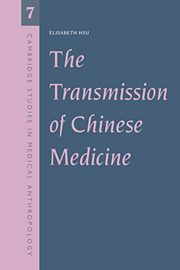Book contents
- Frontmatter
- Contents
- Acknowledgements
- Note on Chinese terms
- Introduction: ways of learning
- 1 The secret transmission of knowledge and practice
- 2 Qigong and the concept of qi
- 3 The personal transmission of knowledge
- 4 Interpreting a classical Chinese medical text
- 5 The standardised transmission of knowledge
- 6 Teaching from TCM texts
- Discussion: styles of knowing
- Appendix: Curriculum for TCM regular students and acumoxa and massage specialists
- Glossary of medical and philosophical terms
- References
- Indexes
5 - The standardised transmission of knowledge
Published online by Cambridge University Press: 04 December 2009
- Frontmatter
- Contents
- Acknowledgements
- Note on Chinese terms
- Introduction: ways of learning
- 1 The secret transmission of knowledge and practice
- 2 Qigong and the concept of qi
- 3 The personal transmission of knowledge
- 4 Interpreting a classical Chinese medical text
- 5 The standardised transmission of knowledge
- 6 Teaching from TCM texts
- Discussion: styles of knowing
- Appendix: Curriculum for TCM regular students and acumoxa and massage specialists
- Glossary of medical and philosophical terms
- References
- Indexes
Summary
With the legitimation of Chinese medicine in the mid-1950s, the Communist Party had instigated a programme for systematising its many strands and currents. This undertaking is reminiscent of earlier attempts at compiling and condensing medical knowledge, repeatedly carried out under government sponsorship throughout the last two millennia, such as the editing of the Basic Questions (Su wen) in the Tang (618–906) and again in the Song (960–1279). In recognition of the continuity that the current efforts have with those in Imperial (Unschuld (1980)1985; Ma 1994:499–516) and Republican times (Andrews 1996, Lucas 1982 with regard to health-care policies), I propose to conceive of them all, past and present, as being directed at a standardisation of knowledge and practice.
The current standardisation of Chinese medicine, elsewhere referred to as ‘institutionalisation’ or ‘professionalisation’, goes hand in hand with its Westernisation and modernisation. The term ‘institutionalisation’ makes it seem that there had been no institutions of Chinese medicine prior to the current efforts, and ‘professionalisation’ is a notion coined with regard to Western biomedicine in North America (Freidson 1970), which implicitly emphasises the hegemony of Western biomedicine and its model role for China. By speaking of a ‘standardisation’ rather than a ‘Westernisation’ or ‘modernisation’ one avoids polarising Western and Chinese cultures or so-called traditional and modern values. The term ‘standardisation’ is meant to emphasise the continuity of the ongoing processes with those in the past.
- Type
- Chapter
- Information
- The Transmission of Chinese Medicine , pp. 128 - 167Publisher: Cambridge University PressPrint publication year: 1999



